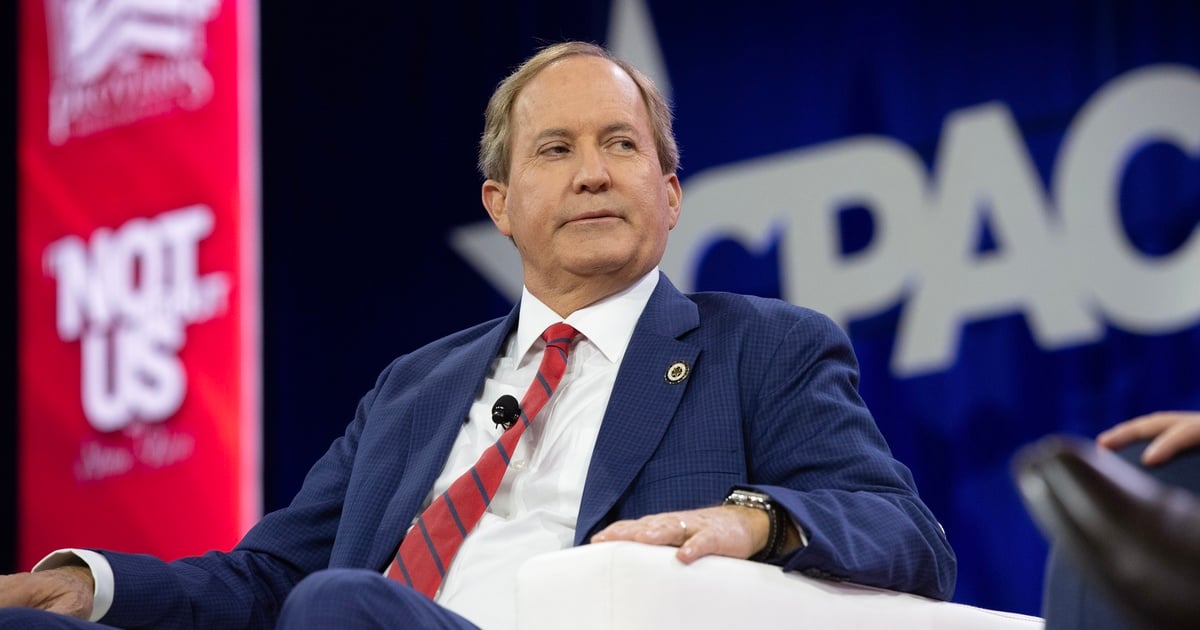Sign up for The Brief, The Texas Tribune’s daily newsletter that keeps readers up to speed on the most essential Texas news.
Attorney General Ken Paxton can’t use a state statute that he repeatedly relies on to scrutinize various companies and nonprofits — including an El Paso migrant shelter network and a nonprofit focused on increasing Latinos’ civic participation — after a federal magistrate judge on Friday ruled the tool unconstitutional, according to Bloomberg Law.
Judge Mark Lane of the Western District of Texas verbally granted a permanent injunction stopping Paxton using what’s called a “request to examine” to probe myriad practices. The ruling stemmed from a lawsuit filed by Spirit AeroSystems, Inc., a Boeing 737 jets manufacturer that received such a request from Paxton earlier this year requiring the company to produce a variety of documents.
Spirit challenged the constitutionality of Texas’ request to examine statute because it requires recipients to “immediately permit” the attorney general to inspect its records, without an opportunity for precompliance judicial review of the request — in violation of the right to freedom from unreasonable search or seizure that’s granted by the Fourth and 14th Amendments of the Constitution. Lane agreed.
“This call for me is easy,” Lane said at a hearing Friday, according to Bloomberg Law.
Lane asked Spirit’s lawyers to file a written order documenting the ruling. Lane’s office did not respond to requests for comment Friday.
Paxton’s office did not immediately respond Friday evening to an inquiry about whether it plans to appeal.
It is unclear how Friday’s ruling might affect cases in which Paxton’s office has used requests to examine that remain unresolved in state courts.
“The office of the Attorney General does not have arbitrary power under an administrative government regulation to demand unfettered access to search and seize property of any business in Texas,” said Kristin Etter, director of policy and legal service at Texas Immigration Law Council, an organization aimed at protecting the rights of Texas immigrants and refugees. “This is textbook 4th Amendment jurisprudence that protects us all from unreasonable searches and seizures.”
The most important Texas news,
sent weekday mornings.
The consumer protection division of the Attorney General’s Office has increased its scrutiny of nonprofits whose missions are largely in opposition to Paxton’s politics, an investigation by The Texas Tribune and ProPublica found. Requests to examine are just one of several legal mechanisms he’s used to pursue those investigations.
A request to examine is a broad tool that is rooted in the authority the state’s constitution of 1876 gave the attorney general over private corporations, according to University of Texas at Austin School of Law adjunct professor Randy Erben, who spoke to ProPublica and the Tribune last spring.
“This is something that goes way, way back to the origins of our Constitution and the basic distrust of private corporations when they wrote that document following Reconstruction,” Erben said.
It’s part of the state’s business and organizations code, applicable to any entity that files incorporation documents within the state. That includes for-profit corporations, like Spirit AeroSystems, and nonprofits.
In late 2022, Paxton’s office sent three separate requests to examine to organizations that had received funding from the Texas Bar Foundation. U.S. Rep. Troy Nehls, R-Richmond, had alleged the foundation was donating to entities that encourage and fund illegal immigration.
The following spring, amid a legislative fight over gender-affirming treatment for minors, Paxton sent requests to two hospitals –– Dell Children’s Medical Center in Austin and Texas Children’s Hospital in Houston — requesting a range of documents related to such care.
The treatment was still technically legal when the office sent the letters in April and May, respectively, but state lawmakers passed a ban the same week Paxton launched his investigation of Texas Children’s Hospital. In anticipation of the law going into effect, the hospital told employees it would discontinue certain gender-affirming treatments.
In perhaps the most well-known case of its kind, Paxton’s office hand-delivered a request to examine El Paso-based Annunciation House, a nonprofit that’s served immigrants and refugees seeking shelter for decades. Paxton accused the migrant shelter network of violating state laws prohibiting human smuggling and operating a stash house.
Typically, these types of letters are mailed and organizations are given a period of days or weeks to respond. In this case, the attorney general initially wanted immediate access to Annunciation House’s documents, including all logs identifying immigrants who received services at Annunciation House going back more than two years. The attorney general later agreed to give the organization an additional day to respond.
Following a legal dispute, a state judge in July denied Paxton’s efforts to shut down Annunciation House.
However, Paxton appealed directly to the state’s all-Republican Supreme Court, which is scheduled to hear arguments in the case early next year.
The office’s request for Spirit’s records was part of an investigation into a door plug that came off a Boeing 737 Max 9 plane in January, forcing an emergency landing. Spirit makes fuselages and installs door plugs like the one that came off the plane.
The attorney general’s investigative letter also demanded records “that Spirit relies on to substantiate its claim that a diverse workplace improves product quality,” enhances performance and spurs the company to make better decisions. In a news release earlier this year, Paxton’s office said his office was investigating whether those practices compromise the company’s manufacturing processes.
More recently, Paxton’s office sent requests to examine to Team Brownsville, a Rio Grande Valley-based nonprofit that provides humanitarian aid to migrants, and Jolt, a group focused on Latinos’ civic participation.
Daniel Hatoum, senior supervising attorney for the Beyond Borders team at TCRP praised Judge Lane’s ruling, echoing concerns about the statute’s broad wording and arguing Paxton’s office has weaponized the language to go after nonprofit organizations.
“We strongly agree this is an easy decision, that this statute is very likely unconstitutional,” Hatoum said.


